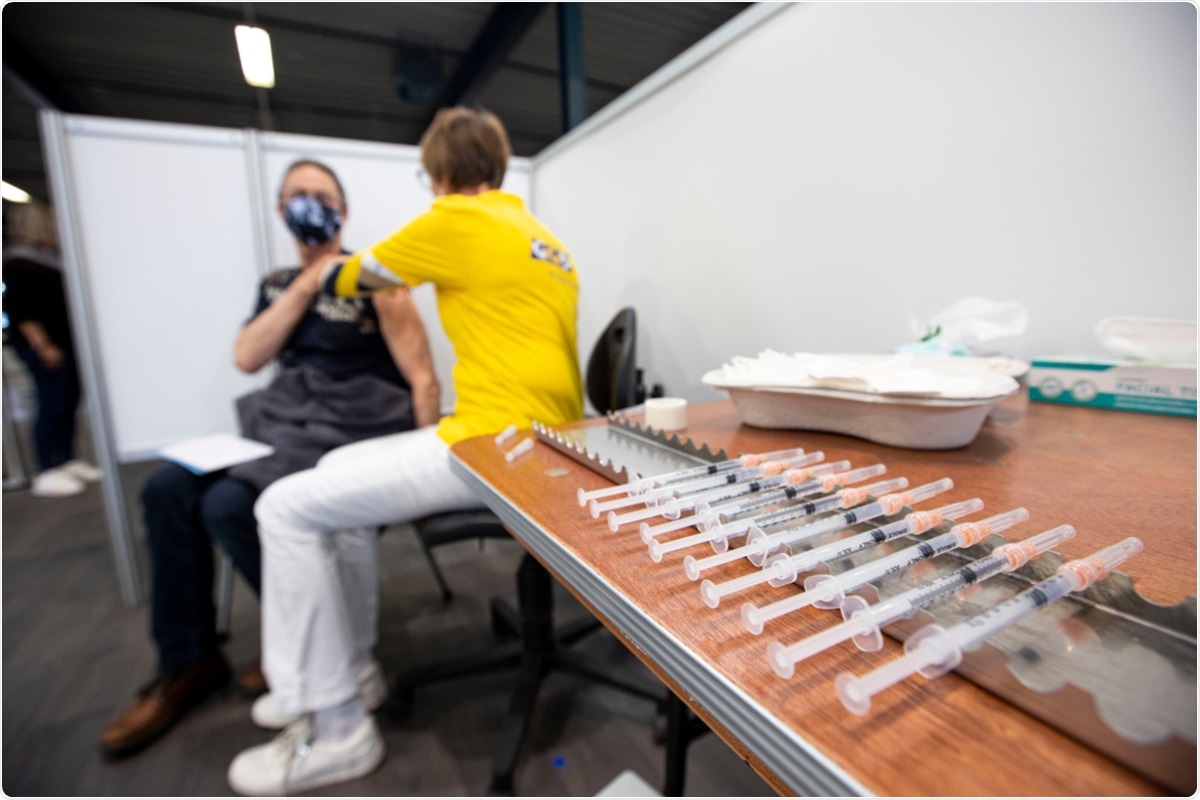
[ad_1]
In early August 2021, a research group reported the effectiveness of vaccination against the transmission of SARS-CoV-2 in the Netherlands by monitoring individuals in close contact with those known to be infected, finding that around 71% protection from the transmission was granted by vaccination.
 Study: Vaccine effectiveness against SARS-CoV-2 transmission to household contacts during dominance of Delta variant (B.1.617.2), August-September 2021, the Netherlands. Image Credit: Nicolas Economou/ Shutterstock
Study: Vaccine effectiveness against SARS-CoV-2 transmission to household contacts during dominance of Delta variant (B.1.617.2), August-September 2021, the Netherlands. Image Credit: Nicolas Economou/ Shutterstock
This study was conducted from February to May 2021, during the rise and peak of the dominance of the alpha variant of severe acute respiratory syndrome coronavirus 2 (SARS-CoV-2). However, in early July of the same year, non-pharmaceutical measures were relaxed in the Netherlands, and the highly transmissible SARS-CoV-2 delta variant quickly rose to prominence.
In an update to this work, the research group reports on the waning effectiveness of the coronavirus disease 2019 (COVID-19) vaccines against transmission to household contacts in the face of these relaxed measures and more transmissible strains of SARS-CoV-2.
A preprint version of the study is available on the medRxiv* server while the article undergoes peer review.
How was the study performed?
The authors state that many SARS-CoV-2 delta variant cases in July left health services unable to engage fully in contact tracing. Thus the incomplete data set from this period are excluded from analysis, beginning on August 9th. Similarly, the Netherlands introduced vaccine passport requirements as of September 24th, which the authors conclude is likely to skew participant behavior, thus the study’s final date.
Unlike during the peak of alpha variant dominance, where a variety of SARS-CoV-2 variants were still strongly represented in the population, the delta variant constituted over 97% of all COVID-19 cases during this period.
As determined by source tracing interviews, index cases that had become infected with SARS-CoV-2 outside of the home were eligible for the study. All participants and their household contacts aged over 12 were then included in the analysis. Each was classified as fully, partly, or not vaccinated, allowing the secondary attack rate of SARS-CoV-2 towards household contacts to be compared between groups.
Four thousand nine hundred twenty-four index cases were included in the study; 53.9% were fully vaccinated, and 8.2% were partly vaccinated. The average vaccination rate amongst adults in the Netherlands is 71%, and thus the overrepresentation of the unvaccinated in the study group indicates vaccine effectiveness against transmission.
Amongst vaccinated index cases, there was an 11.6% incidence of non-vaccinated individuals living in the same home, while amongst the non-vaccinated, 59.1% of household contacts were also not vaccinated.
Vaccine effectiveness against transmission
In cases where the index case is vaccinated but the household is not, then the secondary attack rate was 13%, while unvaccinated index cases induced secondary cases 22% of the time in non-vaccinated household contacts, producing adjusted vaccine effectiveness against transmission of 63%.
Where household contacts were fully vaccinated, transmission from the index case occurred in 11% and 12% of cases when vaccinated or non-vaccinated, respectively. The authors state that bias relating to the elderly being more likely to be fully vaccinated, live in shared accommodation with other index cases, and suffer secondary attack likely skewed this result and thus produced adjusted effectiveness of vaccination against transmission from index cases of 40%.
In the previous study concerning the alpha variant of SARS-CoV-2, vaccine effectiveness against transmission was 71%, possibly a result of the enhanced transmissibility observed of the delta variant. The secondary attack rate amongst non-vaccinated household contacts was lower for the delta variant than alpha, which the authors speculate may be due to more pervasive seroprevalence in the population or the on average younger population of this study.
Waning vaccine effectiveness against transmission over time was also noted in this study. Individuals who had received the vaccine over two months previously were more likely to engage in secondary transmission. As the most vulnerable population were vaccinated earliest, the observed loss in effectiveness against transmission may be partially due to this waning protection.
Conclusions
Before July 2021, individuals positive for COVID-19 and their household contacts were required to quarantine at home for ten days. However, rules were changed to allow fully vaccinated household contacts to avoid quarantine at this time.
Further, the requirement that household contacts produce a negative COVID-19 test before release from quarantine was lifted, likely causing many secondary attack infections to be missed by this study and resulting in an overestimation of secondary attack rates. Differences in testing behavior between vaccinated and non-vaccinated individuals also bias results, where asymptomatic non-vaccinated individuals are less likely to take and report the results of a test.
In any case, this study has identified a 63% rate of protection against transmitting SARS-CoV-2 and 40% against becoming infected. This is lower than the effectiveness against transmission observed in previous studies involving the alpha variant of SARS-CoV-2 and is likely a result of the known enhanced transmissibility of the delta variant in combination with waning vaccine protection in the population.
*Important notice
medRxiv publishes preliminary scientific reports that are not peer-reviewed and, therefore, should not be regarded as conclusive, guide clinical practice/health-related behavior, or treated as established information.
Journal reference:
- de Gier, B. et al. (2021) “Vaccine effectiveness against SARS-CoV-2 transmission to household contacts during dominance of Delta variant (B.1.617.2), August-September 2021, the Netherlands”. medRxiv. doi: 10.1101/2021.10.14.21264959.
[ad_2]
Source link